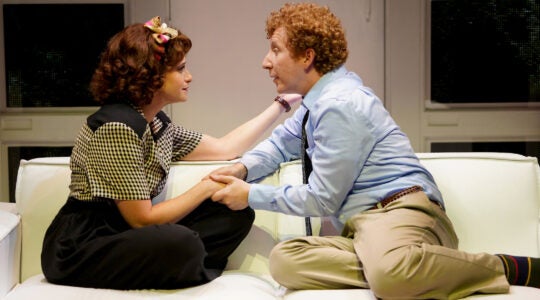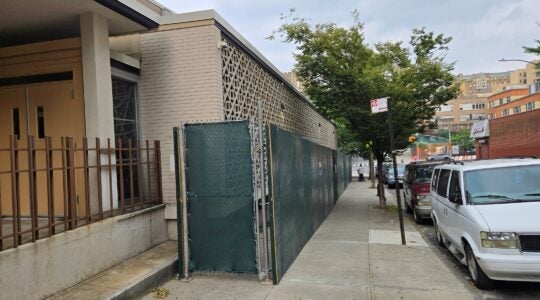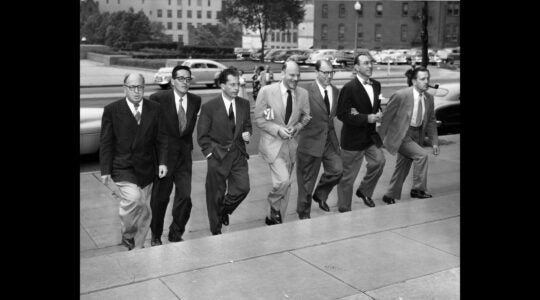Conservative rabbis reminded their constituents this week that, at least when it comes to texting on Shabbat, they can still be counted on to be conservative, with a small c.
It was a week that Conservative rabbis were welcomed by the Obama White House, which apparently still sees their votes in play (as opposed to the Reform and Orthodox who are firmly pro-Democratic or pro-Republican). And it was a week in which the rabbis issued guidelines on performing same-sex marriages (two rings and a modified marriage contract).
Little noticed amid all this liberalism came something of a surprise: Conservative Jews, the rabbis said, should refrain from using computers, cell phones and e-readers on Shabbat.
The call for Shabbat restraint came in a scholarly 86-page responsa called “The Use of Electrical and Electronic Devices on Shabbat.” It was approved by the Rabbinical Assembly’s Committee on Jewish Law and Standards, the same body that issued the gay marriage guidelines. The decision on electronic devices, it said, was “countercultural.”
“This is a countercultural finding because the constant use of electronics is extremely seductive to our generation,” the rabbis said. “In the face of this great desire to ‘stay connected,’ we often forget the cost of losing the precious hours of quiet that Shabbat offers to those who cherish her.”
The responsa makes the case against electronics on halachic grounds, saying that the use of computer technology in particular involves activities that fall into the category of melacha or work. But it also notes the positive commandment to rest on the Sabbath and set it apart from the rest of the week.
“Shabbat can and should be different,” they add.
The decision on electronics came on the heels of concerns among other branches of Judaism about the use of computer technology. Last year, The Jewish Week reported that some Modern Orthodox teens were keeping what they called “Half Shabbos” by texting on their cell phones even as they observed other Sabbath restrictions. And last month, the ultra-Orthodox held a huge rally in New York against the “evils” of the Internet, not only on the Sabbath but seven days a week. They said it was leading both young and old astray with pornography, inappropriate social media and relentless gossip.
The Conservative rabbis also invoked family values in its decision to restrict the use of computers on the Sabbath. “Contemporary families spend much of their time together focused on individual electronic devices,” they wrote. “Faces lit by glowing screen large and small, ears attached to headphones, they busily interact with friends and strangers across the world while making minimal contact with people around them. Shabbat can and should be different.”
The paper goes through biblical, Talmudic and contemporary rabbinic sources, both Orthodox and Conservative, to build a case that turning on an electric device, such as a light bulb, does not constitute either mavir, burning, or boneh, building a structure by completing a circuit. This is at odds with the prevailing Orthodox position that the use of electricity constitutes both burning and building (among other forbidden activities) and is therefore prohibited on Shabbat.
The new Conservative paper rules that on the Sabbath certain electrical devices may be turned on, such as electric lights, elevators and fans for cooling. But it draws a distinction between those devices and others, such as ovens, microwaves, computers and digital cameras, which are not permitted. It even draws a distinction between different types of magnetic swipe cards. Those that are used to make purchases or access public transportation are forbidden, it says, while those “key cards” that are used to enter a hotel room are permitted. E-readers, it says, should be avoided because they make the Internet and electronic “writing” readily accessible.
The decision recognizes that these restrictions do not apply to those who need electronic devices for their physical health and wellbeing and notes that even Orthodox authorities have found ways to make hearing aids, electric carts and other electrical devices permitted to those who need them.
The Conservative rabbis add one other caveat. “We must acknowledge that for some people who are physically isolated, it is not possible to ‘make Shabbat’ with others. For them, telecommunications may be the only avenue for connecting with friends and family and even for participating in Torah study or communal prayer.”
The full text of the decision can be found at www.rabbinicalassembly.org.
Rabbi Daniel S. Nevins, the dean of the rabbinical school at the Jewish Theological Seminary, wrote the paper. Rabbi Nevins was one of the three authors of the decision on gay marriage. He said that the decisions, one apparently toward tradition, and the other seemingly away from it, were not inconsistent. “I see myself as deeply traditional,” he said in an e-mail message. But, he added, “I am mahmir [stringent] on human dignity, a core halachic value which is treated casually some supposedly traditional authorities.” The right of gay Jews to marry in a Jewish ceremony, he said, was a matter of human dignity.
The paper on electronics was passed by a vote of 17 to 2, with two abstentions.
Among the dissenters was Rabbi Elie Spitz of Congregation B’nai Israel of Tustin, Calif. “I’m always looking forward,” Rabbi Spitz said in an interview. “What is clear to me is that electronic readers are becoming normative. Schools in my area are now moving toward e-readers. That’s only going to increase, for financial, convenience and environmental reasons.” A serious Conservative Jew, he said, can “make the distinctions” between reading on their devices and downloading from the Internet on Shabbat and live “at the intersection between tradition and modernity.”
The New York Jewish Week brings you the stories behind the headlines, keeping you connected to Jewish life in New York. Help sustain the reporting you trust by donating today.




